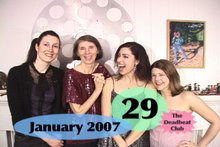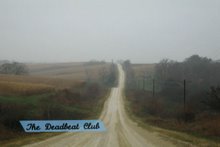Go Blog It!
 Similarly, Bell and Gemmell would like software that organized the contents of the archive into movies—something, at least, to compress and shape it, to summarize its parts.
Similarly, Bell and Gemmell would like software that organized the contents of the archive into movies—something, at least, to compress and shape it, to summarize its parts.
“Auto-storytelling,” Gemmell calls it. “My dream is I go on vacation and take my pictures and come home and tell the computer, ‘Go blog it,’ so that my mother can see it. I don’t have to do anything; the story is there in the pattern of the images.”
...What Bell and the others imagine, ultimately, is a function by which a computer assembles a person’s autobiography, which he or she authorizes and passes on.
- The New Yorker, Remember This?: A project to record everything we do in life, by Alec Wilkinson
Yikes, if this software catches on, I might be out of a job. People can just go to an event, a Black Fly Festival, a German cabaret or a marathon and say to their computer, GO BLOG IT! And there will be no need for fools like me to stay up all night snipping away.
Memory revises itself endlessly. We remember a vivid person, a remark, a sight that was unexpected, an occasion on which we felt something profoundly. The rest falls away. We become more exalted in our memories than we actually were, or less so. The interior stories we tell about ourselves rarely agree with the truth.
Someone uneasy with the candor of his archive could delete the material that pained him. People do it all the time: they destroy papers; they leave instructions in their wills for letters to be burned.
In the novel “So Long, See You Tomorrow,” William Maxwell writes, “Too many conflicting emotional interests are involved for life ever to be wholly acceptable, and possibly it is the work of the storyteller to rearrange things so that they conform to this end. In any case, in talking about the past we lie with every breath we draw.”
In “The Seven Sins of Memory,” the Harvard psychologist Daniel Schacter mentions the work of Shelley Taylor, a psychologist at U.C.L.A., who has written that optimistic people tend to recall their pasts more favorably, and that the versions of their selves that they recalled contributed to their mental and physical health.
- The New Yorker, Remember This?: A project to record everything we do in life, by Alec Wilkinson
This is the sort of thing I have dreamt about since I was little, without even knowing what the hell I was dreaming about. I religiously saved every paper, exam and note from an early age, with hopes that someday, somehow, this would prove useful to me. That someday I would be able to tell "my story" with all these bits and pieces of nothing.Turns out I am not the only history-obsessed egomaniac on the planet. And there is some software being built for people just like me.
SenseCam, Lifelogging, Lifebrowser, a memex - these new technologies all sound so tasty! Or are they scary? Threatening even? Is this beginning to the Terminator movies? Are computers rubbing their gray computer chip cells together and preparing to take over our planet??
Or is this the pre-story to The Matrix? Are the hyper-intelligent computers preparing to turn humans into battery packs to run these crazy programs? How dependent on computers should we become? And why does the following excerpt frighten me just a little?
At night, he said, he sometimes hears his computer working. “I hear the fan, and I think, My system is consolidating new memories,” he said. “It’s like a human being dreaming.”
- The New Yorker, Remember This?: A project to record everything we do in life, by Alec Wilkinson
When I was little, the concept of blogging my daily activites for anyone in the world to see would have blown me away. To take a picture of the tree in my backyard and my recently skinned-knee, and then write a story about it, well, that would have seemed crazy to me.But if I was busy blogging my activities, it is more than likely that I would have spent less time running around the neighborhood late at night with a pack of hooligan kids. I would have been trying to capture a time in my life that was most likey too slippery to bottle up. And now all I have left from it are tattered old revised memories, re-worked time and time again in my dusty nogan, and maybe, that is how I like it.
“People argue about the need to forget things,” he says, “but if you look at business discipline—advising that you write everything down, your goals and objectives, and return to them to see how you did, examining what went wrong—I think the same thing could happen with our personal lives.
Being able to say, ‘Now I realize my tone of voice was threatening’—I think there’s a real positive aspect in having the real record of what things looked and sounded like, and sequences of events, because we often end up believing things that are not based on facts anymore.
Of course, the question built in there is how much can we take? How much do we need not to know reality because we can’t bear the truth?” Aside from issues of self-consciousness, being an entry in someone else’s archive is a problem, although not a new one. People have for centuries betrayed themselves in letters and diaries, and they have used them to betray each other. A videotape, an ill-considered answering-machine message, makes an impression that is not easily undone.
- The New Yorker, Remember This?: A project to record everything we do in life, by Alec Wilkinson
PS And may I just say, for the computer recording my daily thoughts, that catching up on a pile of old New Yorkers with one's morning coffee on the backporch is tantamount to heaven in my dusty old book....











No comments:
Post a Comment